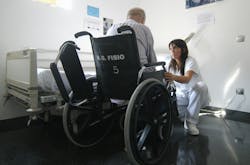People with conditions or habits such as high blood pressure, an irregular heartbeat called atrial fibrillation, or smoking, not only have a higher risk of stroke, they may also have more severe strokes than people without these risk factors, according to a study published in the November 13, 2024, online issue of Neurology, the medical journal of the American Academy of Neurology.
The study involved 26,948 people from 32 countries with an average age of 62. Of this group, half the people had a stroke and half were people who did not have a stroke. Participants without stroke were matched for age and sex to people who had stroke.
Of those with stroke, 4,848 people had a severe stroke and 8,612 people had a mild to moderate stroke. Severe stroke was defined as outcomes ranging from being unable to walk or care for oneself without assistance to requiring constant nursing care to death. Mild to moderate stroke was defined as outcomes ranging from having no symptoms to requiring some help with personal care but being able to walk without the assistance of another person.
Researchers determined the following stroke risk factors for each person: blood pressure higher than 140/90 millimeters of mercury (mmHg); atrial fibrillation; diabetes; high cholesterol; smoking; alcohol use; diet quality; physical inactivity; psychological and social stress; and excess body fat around the waist called waist-to-hip ratio.
Researchers compared how important risk factors were for severe stroke and mild to moderate stroke to people who did not have a stroke. Researchers also compared how important risk factors were in those with stroke only, where people with a severe stroke were matched with and compared to people with a mild to severe stroke.
A total of 74% of those with severe stroke had high blood pressure, compared to 72% of those with mild to moderate stroke. For atrial fibrillation, 11% of those with severe stroke had the condition, compared to 9% of those with mild to moderate stroke. In both groups, 30% were current smokers.
After adjusting for age, sex, country and type of stroke, researchers found people with high blood pressure were 3.2 times more likely to have a severe stroke and 2.9 times more likely to have a mild to moderate stroke than people without high blood pressure.
They also found people with atrial fibrillation were 4.7 times more likely to have severe stroke and 3.6 times more likely to have mild to moderate stroke than people without atrial fibrillation.
Researchers found people who smoked were 1.9 times more likely to have severe stroke and 1.7 times more likely to have mild to moderate stroke than people who were not current smokers.

